Ozzy Osbourne has left the building, people.
The once-in-a-lifetime heavy metal great died this Thursday, 22, his family confirmed on social media. And as everything he meant for music, that was not everything he was: Ozzy Osbourne was the kind of man whose fame rose through all media ventures—including video games.
The much revered Prince of Darkness had much of his life connected to gaming, directly and indirectly. So join us today to celebrate Ozzy Osbourne’s legacy in a manner that does him the proper justice.
Note: Affiliate Disclosure: At PlayRatedGames, our content is made possible by our readers. If you purchase a game or product through links on our site, we may receive a small commission. This support helps us continue publishing honest, independent reviews. Our recommendations are based solely on what we believe offers real value to players — never influenced by affiliate partnerships.
Ozzy Osbourne’s reign in the gaming realm
- Direct hits: When Ozzy stepped into the game
- The soundtrack of mayhem: Ozzy’s musical dominion on game playlists
- Beyond the console: Ozzy’s broader gaming footprint
- The enduring digital legacy of Ozzy Osbourne
Direct hits: When Ozzy stepped into the game
Sometimes, a rock legend doesn’t just lend their music to a game; they become part of its very fabric. Such was the case with Ozzy Osbourne: the man had his share of parts within gaming, for sure. Whether he lent his voice, likeness or creative input, these projects benefitted greatly from his presence.
Brütal Legend: The Prince of Darkness as the Guardian of Metal
One of Ozzy Osbourne’s most celebrated direct participations arrived in the 2009 action-adventure game Brütal Legend—one we’ve talked about at length here at PRG, by the way.
Developed by Double Fine Productions, this title is a heartfelt, headbanging homage to heavy metal culture, set in a fantasy world ripped straight from album art. In this game, Ozzy lent both his distinctive voice and his recognizable likeness to the character known as the “Guardian of Metal.” Sometimes playfully referred to as “Dadbat” in the credits – a nod to a certain infamous incident – this character is a crucial ally to the protagonist, Eddie Riggs, a roadie voiced and modeled after actor and musician Jack Black.
The Guardian of Metal, despite his outwardly dark appearance, is portrayed as one of the game’s more upbeat characters, providing essential upgrades to Eddie’s equipment throughout his journey. The game’s creative director, Tim Schafer, drew from his own musical experiences, assembling a dream team of metal legends for the voice cast, including Lemmy Kilmister of Motörhead, Rob Halford of Judas Priest, and Lita Ford.
Ozzy Osbourne’s inclusion in the game, though, was a masterstroke, cementing the game’s authentic metal theme. His presence wasn’t just a celebrity cameo; it was a fundamental element that gave Brütal Legend credibility and thematic cohesion, resonating deeply with both metalheads and gamers.
Iron Man 2 (J2ME): A Songwriting Credit for the Ages

Ozzy Osbourne also holds a credit in the 2010 mobile game Iron Man 2 (J2ME). While some initial listings might ambiguously credit him simply as “Iron Man,” a closer look at the game’s full credits reveals the true nature of his contribution.
Within the credits sequence, the game explicitly states “Ozzy Osbourne (Words and Music)” for the song “Iron Man.” This means his involvement wasn’t as a voice actor or character, but as a songwriter for the iconic Black Sabbath track that presumably featured in the game’s soundtrack. This distinction highlights how “participation” can be credited in various ways, and a deeper dive is often needed to understand the full scope of an artist’s digital footprint.
Which reminds us…
The soundtrack of mayhem: Ozzy’s musical dominion on game playlists
Ozzy Osbourne’s music isn’t just for headbanging in concert halls; it’s the perfect fuel for virtual adventures. His extensive discography, from his pioneering work with Black Sabbath to his solo anthems, has burst the bubble of traditional music consumption, making its way into countless Ozzy Osbourne—themed games and creating unforgettable moments across diverse genres.
Rocking the Sports Arena: The Madden NFL Series
Ozzy’s work has been a consistent and impactful feature in the popular Madden NFL American football simulation series, showcasing the broad appeal of his sound beyond traditional rock and metal audiences.
Tracks like “Let Me Hear You Scream” and “Crazy Train” were both featured in Madden NFL 11—”Crazy Train”, in fact, proved to be a particularly popular choice, also appearing in Madden NFL Football on Nintendo 3DS (2011), Madden NFL 12 on Xbox 360 and Wii (2011), and Madden NFL 25 on Xbox 360 (2013).
Furthermore, his solo track “I Don’t Wanna Stop”—which, on a personal note, should be much more appreciated and I will die on this hill—was included in Madden NFL 08 for PSP and Windows, where he was credited as “Performed by.”
For Madden NFL 09 and Madden NFL 10 (both PSP), Osbourne received “Written by” credits, indicating his songwriting contributions to tracks featured in those titles. The repeated inclusion of Ozzy Osbourne songs across numerous Madden NFL titles, with EA Sports associated with eight of his game credits, demonstrates a significant and enduring licensing relationship, highlighting the widespread appeal of his music as high-energy anthems perfect for a mainstream sports franchise.
Shredding in Rhythm: Guitar Hero & Rock Band
These were both so obvious yet impossible to ignore choices we had to put them together on the same entry. Both Rock Band and Guitar Hero series, pioneers in music simulation, have extensively showcased Ozzy’s solo catalog and Black Sabbath’s foundational tracks, allowing fans to interact directly with his music.
It all started, of course, with the eponymous heavy metal hymns, Black Sabbath’s “Paranoid”, which was featured in the original Rock Band (2007) and Guitar Hero III: Legends of Rock (2007).
In 2010, Rock Band 2 received a dedicated “Ozzy Osbourne Pack 01” as DLC, which included six original master recordings: “Crazy Babies,” “Diggin’ Me Down,” “I Don’t Wanna Stop,” “Let Me Hear You Scream,” “No More Tears,” and “Soul Sucker.” Meanwhile, “Crazy Train” made another appearance in Rock Band 3 (2010) and, more recently, Rock Band 4 (2015) featured “Miracle Man” on its main soundtrack, and the “Ozzy Osbourne Pack 01” DLC remained compatible.
For Guitar Hero, “I Don’t Wanna Stop” was featured in Guitar Hero: On Tour (2008). Guitar Hero Smash Hits (2009) included “Bark at the Moon” and Black Sabbath’s “Children of the Grave” was featured in Guitar Hero: Warriors of Rock (2010).
Interestingly, Ozzy’s appearance in Guitar Hero: World Tour (2008), where he received a “Music Thanks” credit, was impactful enough to inspire fan-made playermodels and NPCs of Ozzy for Garry’s Mod, demonstrating his significant presence within the game’s community.
Cruising with the Prince: The Grand Theft Auto series
One of the funniest aspects of Rockstar’s Grand Theft Auto franchise is its licensing approach to the most mundane things. That includes the games’ radio stations, which range from weird and less than reputable talk show hosts (looking at you, Lazlow Jones) to…music. And what other way to cater to a massively diverse audience than to make sure GTA’s music branches to several genres?
Ozzy Osbourne was one the answers for these games, as his music also transcended genre-specific rhythm titles to appear in the culturally significant Grand Theft Auto franchise: “Bark at the Moon” was featured in Grand Theft Auto: Vice City (2002), while in Grand Theft Auto: San Andreas (2004), the song “Hellraiser,” a collaboration between Ozzy Osbourne and Motörhead, was included on the in-game radio station, Radio X (it was later removed on subsequent versions due to licensing issues, but the memories—those are eternal).
Moving to higher defined generations, Black Sabbath’s “Heaven and Hell” was featured in Grand Theft Auto IV (2008). Honestly, we can only hope some sort of homage for Ozzy Osbourne is given in further GTA games (hey, it’s still a long trek before Grand Theft Auto 6 comes around, so who knows?)
Beyond Metal: Unexpected appearances
In a notable departure from the heavy metal genre, Ozzy Osbourne’s duet with Lita Ford, “Close My Eyes Forever,” was featured in Karaoke Revolution Presents: American Idol – Encore (2008) and, in a faithful example of Ozzy’s continued relevance in contemporary music and gaming, the inclusion of “Take What You Want” by Post Malone featuring him and Travis Scott in WWE 2K23 (2023) also showcases his willingness to collaborate with artists contemporary to his own time.
Yes, the “Post Malone just put this Ozzy guy on the map” meme comes from this, highlighting Ozzy’s then newfound catering to younger audiences.
Beyond the console: Ozzy’s broader gaming footprint
Ozzy Osbourne’s influence on gaming isn’t confined to just character models or soundtracks. His iconic persona, his deep association with heavy metal culture, and even the lore surrounding his career have subtly permeated the gaming world through promotional activities, ambitious but unreleased projects, and even thematic inspiration.
Commercial cameos: World of Warcraft and more
In 2009, Ozzy Osbourne appeared in a memorable commercial for World of Warcraft, the massively multiplayer online role-playing game.
In the ad piece, he humorously referred to his character using his renowned moniker, “The Prince of Darkness.” While not an in-game appearance, this high-profile promotional collaboration effectively leveraged Ozzy’s celebrity status and established brand to resonate with the gaming audience, demonstrating a direct marketing synergy.
The game that almost was: “Ozzy’s Black Skies”

A particularly intriguing, albeit unfulfilled, chapter in Ozzy’s digital journey involves a video game project associated with his 1997 compilation album, “The Ozzman Cometh.” This game, initially conceptualized as “Ozzy’s Black Skies,” was reportedly in development from summer 2000 to the end of 2001.
Descriptions suggest it might have been a Flash or Java-based game involving elements like “throwing crosses at bats or catching bats.” Despite these early plans and the creation of a song titled “Black Skies” specifically for the game (later released as a B-side to “Dreamer”), the project was never officially released with Ozzy’s intellectual property. Instead, it was retooled and launched in 2002 under a different title, “Savage Skies,” completely devoid of any Ozzy branding.
Cultural echoes: Tributes and inspirations
Beyond direct participation and licensed content, Ozzy Osbourne’s profound influence on heavy metal culture has subtly permeated video games through thematic elements and general artistic inspiration.
For instance, games like Faith: The Unholy Trinity are stylized after 8-bit computer games of the early 1980s and draw inspiration from the “Satanic panic” of the 1980s-90s. This cultural phenomenon heavily targeted heavy metal musicians, including Ozzy, associating them with dark themes and moral outrage.
Furthermore, a meta-reference in the animated music video for “Hellraiser” (Ozzy Osbourne and Motörhead) shows Ozzy and Lemmy Kilmister playing an arcade game, subtly linking his persona to gaming culture in a broader sense.
The enduring digital legacy of Ozzy Osbourne

Ozzy Osbourne’s journey through the industry of video games is as diverse and impactful as his legendary musical career. From lending his voice and likeness to characters that embody the spirit of heavy metal, to having his iconic anthems reverberate through virtual worlds, his presence has left an indelible mark on interactive entertainment.
His enduring relevance, spanning from early Black Sabbath tracks to contemporary collaborations, demonstrates a remarkable longevity that few artists achieve. The sheer volume of his presence is underscored by records indicating he has been credited on 27 games—a testament to his adaptability and the timeless appeal of his music and persona.
This extensive involvement in Ozzy Osbourne gaming showcases a unique crossover appeal, bridging the gap between the music industry and the gaming world, engaging both his dedicated fanbase and new generations of players.
The Prince of Darkness’s digital footprint continues to resonate with gamers worldwide, a testament to a legacy that is not merely preserved but actively celebrated and experienced through these dynamic and immersive mediums. As we reflect on his incredible contributions, it’s clear that Ozzy Osbourne didn’t just play the game; he changed it, leaving behind a legacy that will continue to rock the virtual world for ages to come.
He is not merely a musician whose songs appear in games; he is a true “Metal God” whose influence has actively shaped and enriched the digital realm. It’s only fitting that his last show, in July 5th, ended on a high note: “Mama, I’m Coming Home“, still carrying the weight of a man who’s been battling his demons and rocking for ages.
A true testament, to a true legacy.
And he will forever be missed.


